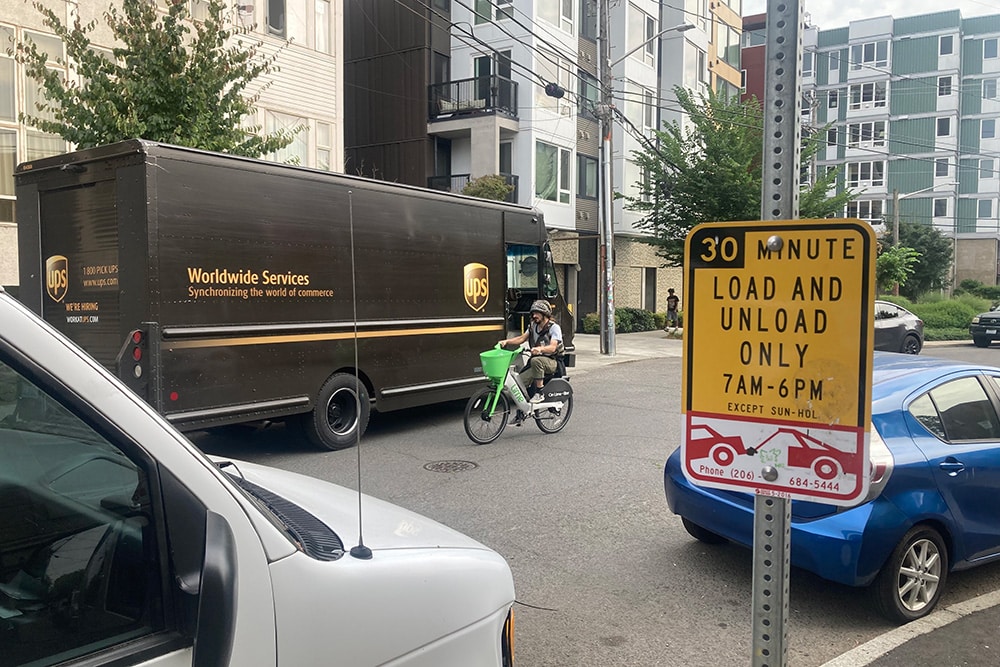Home » Innovation & Technology » Mobility Data Specification
Innovation & Technology
Mobility Data Specification
stock.adobe.com / metamorworks
Background and Perspectives
Transportation network companies (TNCs) entered many large American markets around 2012. City leaders were unsure of regulatory requirements necessary to manage this new mode of mobility service. Transportation professionals worked together to develop a data format called the Mobility Data Specification (MDS), which is governed by the nonprofit Open Mobility Foundation (OMF). More than 115 cities are using MDS to help understand and manage the impact of mobility providers operating on the public right of way. Although MDS is mainly focused on scooters, some believe that if widely adopted, it can transition to other transportation providers such as TNCs and even future transportation modes like drones.
Some mobility providers have resisted attempts to share data with city regulators, citing consumer privacy and competitive concerns. Cities and mobility companies appear to disagree about the risks and benefits of sharing MDS, which has implications that may impact the future of mobility operations. Cities may withhold permits to operate or mobility providers may decide not to operate if certain data is required.
The Specification
Transportation professionals have always been interested in standards as a way of allowing interoperability, ensuring uniformity, avoiding confusion, and ensuring safety. GitHub’s MDS page notes that MDS is based on the General Transit Feed Specification (GTFS) and the General Bicycle Feed Specification (GBFS). GTFS and GBFS were known and accepted by cities because they allowed stakeholders to understand, manage, analyze, and visualize data. Third-party data companies would get this information and produce content that cities could use to understand what was happening on the public right of way. There was little pushback from vendors and cities regarding the handling and use of GTFS and GBFS.
In terms of mobility data, GitHub explains, “… the goals of MDS are to provide a standardized way for municipalities or other regulatory agencies to ingest, compare and analyze data from mobility service providers, and to give municipalities the ability to express regulation in machine-readable formats.” MDS is a data feed that consists of mobility data in a standard format. There are three main parts of the data;
- Provider: data in a standard format that the vendor submits to the municipality.
- Agency: information that is sent from the municipality to the vendor.
- Policy: where operators can get information related to municipal regulations such as speed, geofences, etc.
Context
In the mid 2000s many municipal transportation leaders were attempting to get TNCs to share data to better understand the changes this type of mobility service was bringing to the transportation ecosystem. Some transportation leaders became interested in a project that would allow municipalities to receive verifiable operational data from mobility companies. The reasoning was simple: Mobility companies access this information to understand their operating environment. Why shouldn’t cities, which allow the mobility service on the city owned right of way, have important information available to help develop strategy and enforce policy?
Technology vendors specialize in aggregating data and providing it to cities to help understand, visualize, and manage the effects of mobility assets. This helps cities plan and manage resources to promote strategies to help manage activities that align with a city’s goals on the largest public asset; the public right of way. For instance, if a city were planning a bike path, it would be beneficial to have trip information like start time, end time, path traveled, and frequency. In addition, cities can address equity concerns and validate that mobility companies have resources positioned in historically underserved areas.
Stakeholder Reaction
There are some clear benefits for mobility providers to give MDS data to cities. Mobility providers can have the same specification and easily send data to different entities using the same format. There appear to be some important conflict points with MDS data in that it may include an anonymized trip ID number and data that pings periodically throughout a trip, which highlights privacy concerns for some.
Several civil liberties organizations also oppose some of these features in MDS. For instance, anonymized trip data can potentially be de-anonymized. Much of the concern appears to be related to near real-time data sent to the municipality along with granular data that can potentially be used to identify specific users. These civil liberties organizations also voice objections to the geolocation data including information about the start and end of a trip along with breadcrumb data that shows geolocation pings during a trip.
For competitive reasons, mobility companies may not want others to know about their prices, availability, number of trips, duration of trips, cost per trip, fleet size, utilization, distribution of assets in a market, number of units out of service, etc. Even with data sharing restrictions in place, mobility companies may not want there to be a simple electronic way for competitors to somehow see their business data, in real time, and in a standard format. Some in the mobility industry believe that it is easier to provide data in a standard format so that different formats would not need to be developed for different cities. The Alliance for Parking Data Standards has created a vocabulary so the standards will make more sense to end users.
History has often shown that the most used format often becomes the industry standard which may be why there is focus on MDS as it could be required for various transportation platforms. Computer Scientist and US Navy Rear Admiral Dr. Grace Hopper said, “The wonderful thing about standards is that there are so many of them to choose from.”
Inspiration was drawn from these and other sources:
- Slate.com / Cities Can See Where You’re Taking That Scooter
- Micromobility.io / The latest on the war over micromobility data—a conversation with David Zipper
- openmobilityfoundation.org / Privacy & Data Best Practices
- nakedsecurity.sophos.com / Uber sues LA in bid to protect scooter riders’ geolocation data
Martin R. Arroyo is director of transportation services at the University of Washington Bothell/Cascadia College and a member of IPMI’s Technology Committee. He can be reached at arroyom@uw.edu.
-
This author does not have any more posts.













